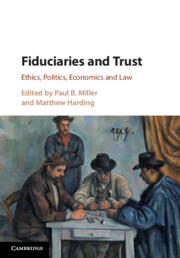Book contents
- Fiduciaries and Trust
- Fiduciaries and Trust
- Copyright page
- Dedication
- Contents
- Contributors
- Acknowledgements
- Introduction
- Part I Personal Trust and Fiduciary Relationships
- 1 Fiduciary Grounds and Reasons
- 2 Trust and Advice
- 3 Contracts, Fiduciary Relationships and Trust
- 4 Trust, Autonomy and the Fiduciary Relationship
- 5 The Psychology of Trust and Fiduciary Obligations
- Part II Personal Trust and Fiduciary Duties
- Part III Political Trust and Fiduciary Government
- Part IV Trust and Fiduciary Law in Context
- Index
1 - Fiduciary Grounds and Reasons
from Part I - Personal Trust and Fiduciary Relationships
Published online by Cambridge University Press: 13 March 2020
- Fiduciaries and Trust
- Fiduciaries and Trust
- Copyright page
- Dedication
- Contents
- Contributors
- Acknowledgements
- Introduction
- Part I Personal Trust and Fiduciary Relationships
- 1 Fiduciary Grounds and Reasons
- 2 Trust and Advice
- 3 Contracts, Fiduciary Relationships and Trust
- 4 Trust, Autonomy and the Fiduciary Relationship
- 5 The Psychology of Trust and Fiduciary Obligations
- Part II Personal Trust and Fiduciary Duties
- Part III Political Trust and Fiduciary Government
- Part IV Trust and Fiduciary Law in Context
- Index
Summary
This paper pursues two questions: what is it in the fiduciary relationship that grounds this transfer of legal power? And, given this grounds, what kind of reason (e.g. practical, moral or otherwise) does the fiduciary then have to act on behalf of the beneficiary? In response to the first, it argues that the principle modes of grounding the transfer of legal power — mutual consent and presumed consent — both involve trust. And in response to the second, it argues that this involvement of trust entails that a fiduciary’s reason for action is ultimately third personal.
Keywords
- Type
- Chapter
- Information
- Fiduciaries and TrustEthics, Politics, Economics and Law, pp. 17 - 34Publisher: Cambridge University PressPrint publication year: 2020

